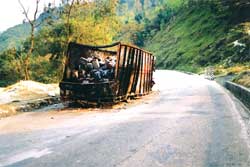 The Maoist blockade of more than a dozen districts of central Nepal couldn't have come at a worse time for Pokhara.
The Maoist blockade of more than a dozen districts of central Nepal couldn't have come at a worse time for Pokhara. At the height of the trekking season, hundreds of tourists bound for the Annapurna circuit or taking buses to Kathmandu are stranded. For this tourist-dependant town, when visitor numbers go down everyone from vegetable farmers to paragliding companies are hit.
Students waiting for their SLC exams have been affected, traders have lost business, transporters have no income and, for the most part, it is the poorest people who have suffered the most.
Now, the government is telling the people of Pokhara to show up in large numbers for the public felicitation of the king on 25 March, but they are in no mood to do so.
Pokhara's bazars wear a deserted look as trucks bearing food and supplies from Birganj and Bhairawa have been disrupted. Basic commodities like salt, oil and sugar have disappeared, and if available, they cost up to 50 percent more.
Similarly, farmers who used to supply vegetables, meat, eggs and milk from outlying areas like Syangja, Parbat, Baglung, Myagdi, Gorkha, Tanahu and Lamjung are badly affected. "There is no light in the villages and now we cannot even light the lanterns because there is no kerosene," says Bhanu Regmi, a student from Parbat who has come to Pokhara to see if he can buy essentials. Maoists have sent back mules carrying milk and other produce into Pokhara.
The Maoists have a foolproof way of enforcing their blockade: burn buses. After three local buses in Lamjung and Dhading were set on fire last week, no bus owner dared ply the highways.
"More than 80 percent of our investment in the vehicles is loaned, we need to pay the interest," says Dhaulagiri Zone Transport Coordination Committee Chairman Hari Khanal. Pokhara's produce, like noodles and confectionaries, have also started piling up. Factories have started laying off workers.
The government is still saying the situation is under control and seems to be relying on the Maoists squandering their public support through the blockade. The army has also been escorting vehicles in convoys along the Prithibi Rajpath. Trucks and buses coming to Kathmandu have been taking the old Tribhuban Rajpath since it doesn't fall under the current Maoist blockade.
On Tuesday, Finance Minister Prakash Chandra Lohani and Home Minister Kamal Thapa arrived in Pokhara and assured transport entrepreneurs that that government has created a 'basket fund' of Rs 100 million to compensate vehicle owners. But bus owners have heard these promises before, and there haven't been too many takers.
The Maoist Kaski district secretary, Jivan, issued a press statement on Monday saying all vehicles would be allowed to operate except government and military ones. He also warned businessmen they would face punishment for hoarding. But even this assurance from the Maoists hasn't erased the fear of bus and truck owners.
FNCCI has calculated that the country is suffering losses of more than Rs 400 million a day from the blockade. "The Maoists have also stopped production units and not allowed us to load and unload our goods, and the figure is sure to rise," says FNCCI vice president Chandi Raj Dhakal.


